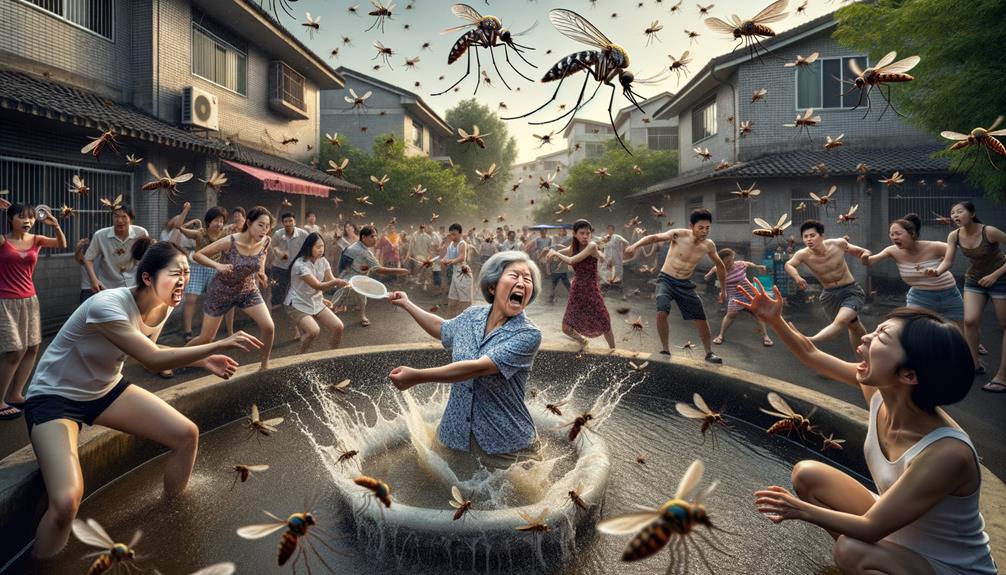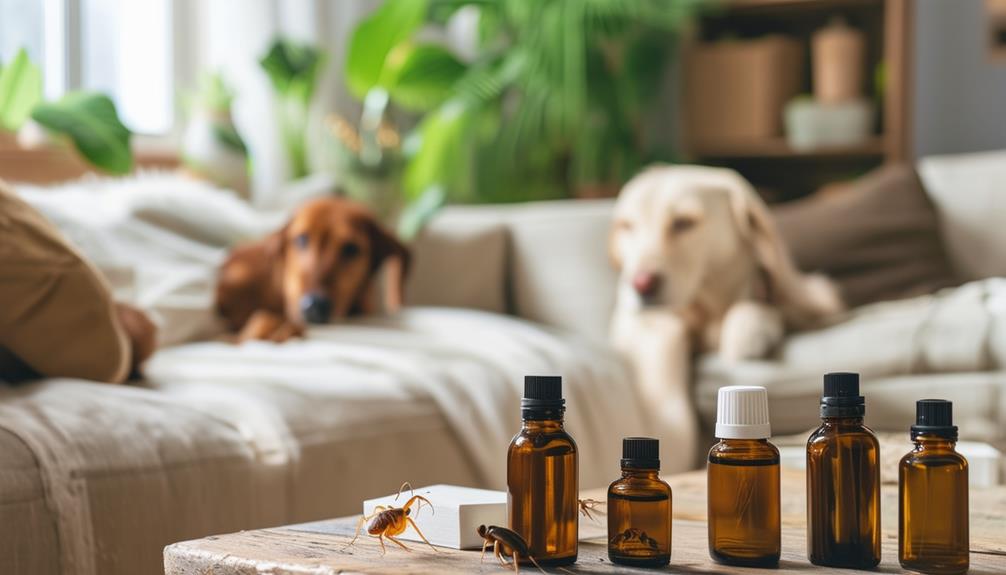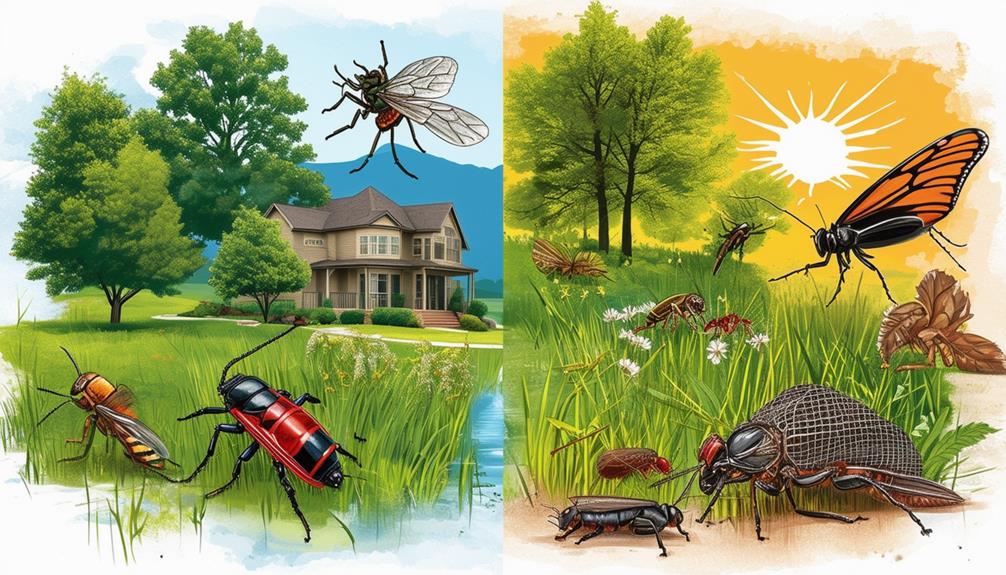In Bentonville, West Nile virus, Zika, and chikungunya are prevalent, impacting public health. Local data confirms disease-carrying mosquitoes. Aedes albopictus and Culex species increase disease transmission. Mosquito activity fluctuates due to environmental factors. In 2022, Bentonville had 137 mosquito days, slightly below historical levels. Weather influences breeding, with crucial conditions between 50-95°F and humidity above 42%. Preventive measures like removing standing water and using repellents are crucial. Concerns include disease transmission and allergic reactions. Surveillance aids in early detection of outbreaks. Collaborative efforts are key for control. The data provides valuable insights for public health management in Bentonville.
Key Takeaways
- Mosquito-borne diseases like West Nile virus and Zika pose significant health risks in Bentonville.
- Surveillance data confirms disease-carrying mosquitoes, emphasizing the need for preventive measures.
- Weather impacts mosquito breeding, with rainfall creating breeding sites and drought reducing natural predators.
- Community engagement in mosquito prevention is crucial through education and proactive measures.
- Effective mosquito control measures, including surveillance, larviciding, and public health collaboration, are essential for public health protection.
Mosquito-Borne Diseases in Bentonville
During the warmer months in Bentonville, Arkansas, you face significant risks of contracting mosquito-borne diseases such as West Nile virus, Zika, and chikungunya. Local surveillance data highlights the presence of disease-carrying mosquitoes like Aedes albopictus and Culex species, increasing the disease transmission potential in the area. To combat this threat, public health campaigns in Bentonville emphasize the importance of implementing mosquito control measures. These campaigns educate residents on ways to reduce mosquito breeding sites and protect themselves from bites, ultimately aiming to decrease the spread of mosquito-borne illnesses.
Collaborative efforts between residents and local authorities play a vital role in addressing the challenges posed by mosquito-borne diseases. By working together, the community can effectively implement preventive measures and respond promptly to any outbreaks. Through the collective engagement of individuals and organizations, Bentonville can enhance its resilience against the health risks associated with mosquitoes. Stay informed and proactive in supporting these initiatives to safeguard the well-being of yourself and the community.
Impact of Mosquito Activity Levels
The significance of mosquito-borne diseases in Bentonville correlates directly with the fluctuating levels of mosquito activity, influenced by environmental factors such as rainfall and drought. In 2022, Bentonville experienced 137 mosquito days, indicating a notable presence of mosquitoes. This number is slightly lower than the historical perspective in 1979 when Bentonville had 165 mosquito days. Over time, there's been a subtle increase in the average number of mosquito days per year in Bentonville.
Mosquitoes breed prolifically in areas with standing water, which is often abundant after heavy rainfall, contributing to heightened mosquito activity levels. The impact of these environmental conditions on mosquito breeding is vital to public health in Bentonville, as it directly affects the population's exposure to mosquito-borne diseases. Understanding the relationship between rainfall, standing water, and mosquito activity levels is essential for implementing effective control measures to mitigate the risks associated with mosquitoes in Bentonville.
Role of Weather in Mosquito Breeding
Ideal weather conditions, characterized by specific temperature and humidity ranges, play an important role in facilitating the breeding of mosquitoes in Bentonville. Mosquitoes thrive in temperatures between 50-95°F and humidity levels above 42%. Rainfall and drought also have a notable impact on mosquito breeding patterns and population growth. For instance, heavy rainfall creates pools of standing water, providing optimal breeding sites for mosquitoes, while drought conditions can lead to a decrease in natural predators, allowing mosquito populations to surge. Understanding these weather patterns is essential for predicting and controlling mosquito breeding in the area.
| Weather Factor | Impact on Mosquito Breeding |
|---|---|
| Temperature | Facilitates breeding within 50-95°F range |
| Humidity | Breeding favored at levels above 42% |
| Rainfall | Creates standing water for breeding sites |
| Drought | Reduces natural predators, leading to population growth |
| Standing Water | Ideal breeding sites post-storms |
Community Measures for Mosquito Prevention
To effectively combat mosquito infestations in Bentonville, implementing proactive community measures is essential. Community measures for mosquito prevention play an important role in reducing the prevalence of mosquitoes in the area. Removing standing water, where mosquitoes breed, from locations such as flower pots and gutters is a fundamental step.
Bentonville residents can further protect themselves by using mosquito repellents containing DEET or Picaridin. Installing screens on windows and doors in homes can act as a barrier, preventing mosquitoes from entering living spaces. Community education programs are also valuable in raising awareness about the significance of mosquito control practices.
Regular yard maintenance, including mowing lawns and trimming vegetation, can help reduce mosquito resting areas. By actively engaging in these mosquito prevention strategies, the community in Bentonville can collectively contribute to mitigating the mosquito population and creating a healthier environment for all residents.
Health Risks Associated With Mosquito Bites
When considering the health risks associated with mosquito bites, the primary concerns for residents of Bentonville revolve around disease transmission and allergic reactions to mosquito saliva. Mosquitoes pose a significant health risk in Bentonville due to their potential to transmit diseases such as West Nile Virus, Zika, and Dengue Fever. Apart from disease transmission, allergic reactions to mosquito saliva can cause itching, swelling, and discomfort at the bite site, leading to potential skin infections, particularly in vulnerable individuals like children and those with weakened immune systems.
Symptoms of mosquito-borne illnesses can range from mild fever and body aches to severe neurological complications, and in extreme cases, even death. To mitigate these risks, it's important for residents to take preventive measures such as using insect repellent, wearing protective clothing, and eliminating standing water to reduce the prevalence of mosquito-borne diseases in Bentonville.
Public Awareness on Mosquito Control
Public awareness campaigns in Bentonville actively educate residents about the importance of mosquito control measures. Through various initiatives, Bentonville aims to enhance public awareness and promote community involvement in mosquito control efforts.
Educational materials are readily distributed to inform residents about the risks of mosquito-borne diseases and the significance of prevention. Workshops and training sessions are organized to equip individuals with the necessary knowledge and skills to implement effective mosquito control measures in their surroundings.
Bentonville emphasizes the role of individual responsibility in identifying and eliminating mosquito breeding sites to mitigate the mosquito population effectively. By fostering a culture of awareness and education, the community becomes better equipped to tackle the challenges posed by mosquitoes.
Together, residents play an essential role in reducing the prevalence of mosquitoes and safeguarding public health. Through collective efforts and informed actions, Bentonville aims to create a safer environment with fewer mosquito-related health risks.
Importance of Mosquito Surveillance
In Bentonville, effective mosquito surveillance plays an essential role in tracking populations and evaluating disease transmission risks. Mosquito surveillance serves as a pivotal tool in safeguarding public health by providing valuable insights into the dynamics of mosquito-borne diseases.
Here are three key reasons highlighting the importance of mosquito surveillance:
- Targeted Control Measures: Surveillance data guides the implementation of precise and effective control measures to mitigate the risk of mosquito-borne diseases in the community.
- Early Warning of Disease Outbreaks: By monitoring mosquito populations, surveillance programs offer an early warning system for potential disease outbreaks carried by mosquitoes, enabling proactive public health interventions.
- Protecting Public Health: Regular surveillance activities are essential for maintaining effective mosquito control strategies and safeguarding the well-being of the community against public health threats posed by mosquitoes.
Through thorough mosquito surveillance efforts, Bentonville can proactively address disease transmission risks, implement targeted control measures, and ultimately protect public health from the threats posed by mosquitoes.
Frequently Asked Questions
Are Mosquitoes Growing Public Health Threat?
Mosquitoes indeed pose a growing public health threat. Prevention methods are essential to combat the rising mosquito population, limit disease transmission, raise public awareness, and control the environmental impact. Health risks increase with climate change.
What Diseases Do Mosquitoes Carry in Arkansas?
Mosquitoes in Arkansas carry diseases like Zika virus and West Nile virus. Malaria transmission, Dengue fever, Chikungunya, and Encephalitis risks are other mosquito-borne illnesses. Public health concerns drive vector control strategies and disease prevention efforts.
What Are the Effects of Mosquitoes on Human Health?
Mosquitoes pose significant health risks by transmitting diseases like malaria and Zika. Prevention methods, public awareness, and control strategies are essential to combat mosquito-borne illnesses. Understanding the environmental impact and implementing effective measures can mitigate these risks.
What Is the Biggest Disease Caused by Mosquitoes?
The biggest disease caused by mosquitoes globally is malaria, affecting over 200 million people annually. In Bentonville, the main concern is West Nile Virus, transmitted by Culex mosquitoes. Prevention is crucial.





